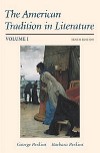Selections in your text represent a basic "primer" in the thought of Ralph Waldo Emerson and the nineteenth-century New England Transcendentalists. "Nature" (1836) analyzes what Emerson believes to be a hierarchy of functions, or "ministries," observable in the natural universe, ranging from simple "commodity" to its reflection of its inherent divinity. "The American Scholar" (1837) and "The Divinity School Address" (1838) were both readings delivered at Harvard University, the latter at the invitation of the students themselves, rather than the faculty. The first, "The American Scholar," outlines the influences on the true scholar and his or her duty for self-trust. The second, "The Divinity School Address," created something of an academic outcry, as Emerson attacks the "historical Christianity." "Self-Reliance" (1841) is a synthesis of themes from several addresses and commentaries written between 1832 and 1839. The essay defines succinctly the "relations of the soul to the divine mind," the focus of Emerson's philosophy. "The Over-Soul" (1841) is an enlargement of this position and "central to understanding Emerson's faith" (Perkins). Poetry selections reflect works composed over a period of some 35 years. Passages from his journal open readers to Emerson's world and the colleagues like Thoreau, Carlyle, and Hawthorne who populated it so richly. |



 2003 McGraw-Hill Higher Education
2003 McGraw-Hill Higher Education